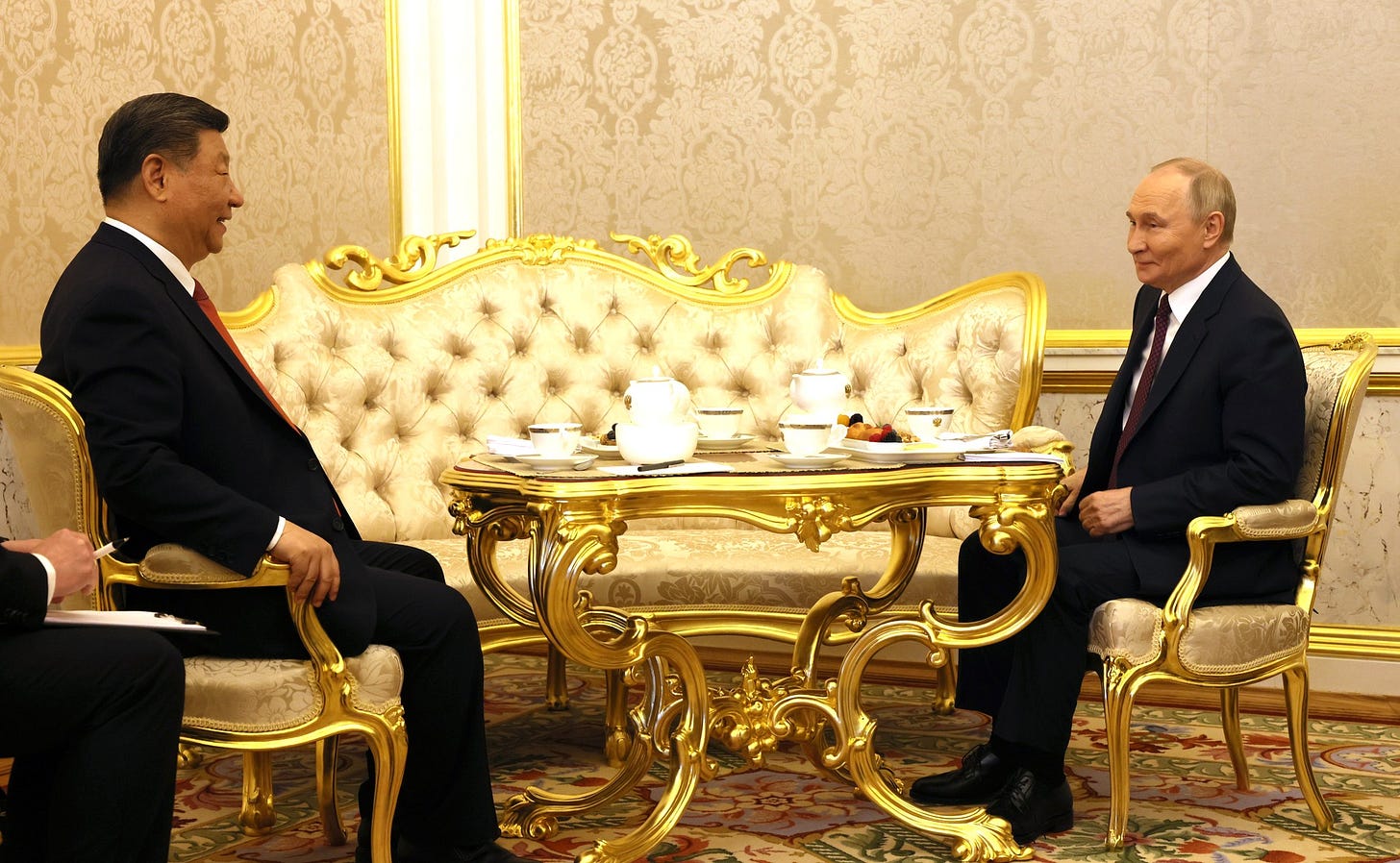What happened when monsters mingled?
Beijing’s jamboree event for dictators raises some intriguing questions
Teatime for tyrants: Comrade Xi asks his old pal Vlad whether he would prefer an organ transplant instead of a pastry
When Xi-Jinping China’s President for Life, gathered together many of the world’s most odious dictators to celebrate Japan’s World War II defeat 80 years ago, what did these monsters talk about?
It’s a tantalising question because, aside from the public declarations of common purpose and lovey-doveyness, who knows what really went on? However a wonderful hot mike incident caught Messers Xi and Putin discussing the prospect of prolonging their lives by use of organ transplants.
Whether General Secretary Xi boasted about his nation’s sordid record of forced organ transplants is unclear and whether President Putin was asking for transplant tips is not known but their interest in immortality tells you a great deal about their mindsets. Goodness only knows what happened to the hapless individuals responsible for this rare breach of secrecy.
Unfortunately the loose microphone wielders were not on duty when Kim Jong Un, the portly leader of North Korea, clambered into Vladamir Putin’s limo for a seemingly amiable chat. Did he offer up more of his citizens to be sent as cannon fodder for Russia’s war with Ukraine? Or did they merely discuss how North Korea’s nuclear weapons fantasies can be turned into reality?
There was also an opportunity for Myanmar’s Acting President Min Aung Hlaing to swop anecdotes with the Congolese President Denis Sassou Nguesso about how to carry out a genocide. They are, after all, both very experienced in this matter.
Some, but only a few, of the participants, became heads of state through election and may therefore object to being classified as dictators. Presidents Alexander Lukashenko of Belarus and the Iranian President Masoud Pezeshkian, however were ‘elected’ in rigged polls, maybe they had a chance to chat amiably about how to hold elections in the absence of an opposition or anything resembling a free press to monitor their activities. Anyway, although both of them have a wealth of election rigging expertise, there is always room for improvement.
Not everyone at this gathering was a fully qualified monster, some had monster-hood thrust upon them, notably Cambodia’s King Norodom Sihamoni who is merely a figurehead for the very sinister people who put him in power and therefore hardly counts as a monster in his own right.
Overall it is fitting that the world’s largest and most powerful dictatorship should have been host for this event because under Xi Jinping the Chinese Communist Party has acquired a taste for reforming the world order, or as Mao Zedong used to say, ‘looking East’.
To assume centrality in this process China had to show how a dictatorship could put on a flawless parade of military strength, how it could literally clear the streets of its capital city from mere residents and how every single moment could be immaculately orchestrated so that everything went to plan.
Inevitably this scheme also involved the re-writing of history (a dictatorship speciality) so that non-participants at Xi’s party could be written out of the event they were supposed to be commemorating. Thus the part played by Western nations plus Australia and New Zealand in defeating the Japanese was expunged from the record. In some ways this is reasonable because there has undoubtedly been far too much emphasis on the American role in the Pacific war.
But the re-writing also involves ignoring the impressive role of Communist guerillas in places such as Malaya and even Hong Kong where, with few resources, they performed heroic acts of resistance. Maybe acknowledging non-state guerilla activity was suppressed least it might give ideas to anyone contemplating the removal of today’s dictatorships.
And then there is uncomfortable fact that the main resistance to the Japanese in China came from the Kuomintang (KMT) not the Communist forces. Acknowledging the leading role of the KMT and the far less important role of the Communists is not part of Comrade Xi’s narrative.
But let us not be diverted by history in circumstances where there was a great opportunity for the paranoid dictators, would-be dictators and a smattering of their clients, to get together in a place where they had no fear of being assassinated (often a problem for people of this kind) or being subject to a scintilla of criticism (always an aversion for people of this kind).
The Orange Blob in the White House was clearly put out over not being invited to an event combining his two most favourite things: a massive military parade and a gathering of tyrants. But, if it’s any consolation, my invitation also got lost in the post. I resolve to try harder, with special emphasis on mastering synchronized clapping, to get an invite next time around.


